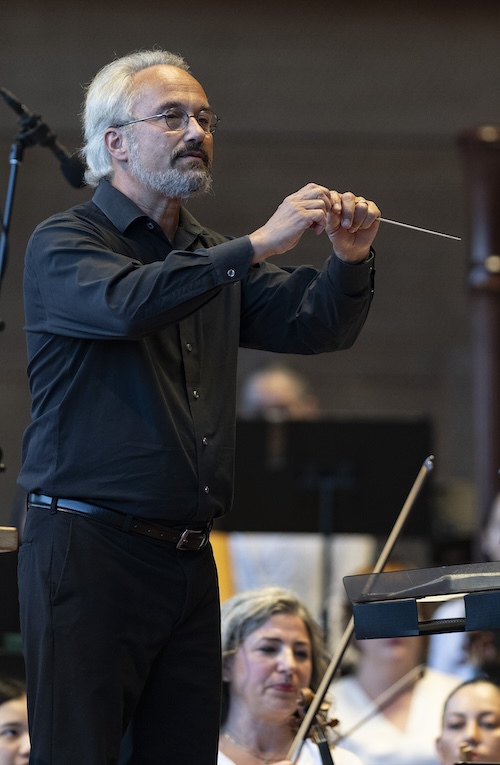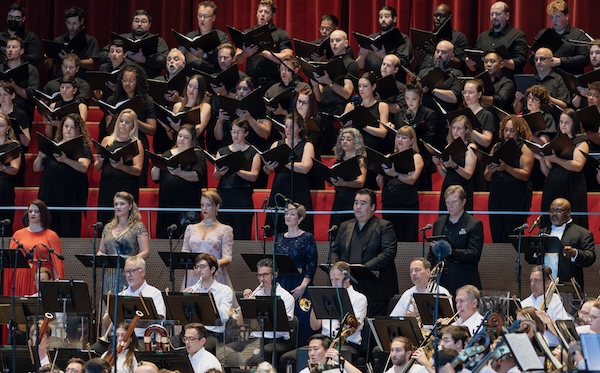Sonic overkill takes the luster off of Kalmar’s Mahler farewell

It wasn’t looking good about an hour before Carlos Kalmar’s final Grant Park Music Festival program Friday night. A large black cloud hovered over downtown Chicago and the rain began to fall.
But by concert time the rain had passed, the sun was shining and one could hardly have wished for better weather for Kalmar to close his quarter-century reign as artistic director and principal conductor with Gustav Mahler’s “Symphony of a Thousand.” The rain later returned with a vengeance but the weather gods were beneficent once again, and the downpour held off until immediately after the performance had concluded.
With its vast forces, Mahler’s Eighth Symphony seemed just the kind of epic work and slam-bang finale to close the lakefront series’ summer season as well as to round off Kalmar’s 25 years in Chicago—one of the richest and most artistically successful conductor tenures in Chicago musical history.
The crucial issue of a successor still appears to be an open question. Concerts by a trio of potential music directors-in-waiting this summer were mixed overall and there seems to be no obvious choice on the near horizon.
The good news is that Kalmar, 66, will continue to be a presence at Chicago’s lakefront series. Before the music began, Grant Park board officials announced that Kalmar is the inaugural recipient of the festival’s Nikolai Malko Award (named for the festival’s first chief conductor). More crucially, Kalmar has been given the title of conductor laureate and the popular maestro, they said, will continue to return regularly to lead Grant Park concerts “for many years to come.”
Premieres of Gustav Mahler’s music tended to baffle contemporary critics and audiences but the 1910 debut of the Eighth Symphony in Munich was one of the rare unqualified successes the composer enjoyed in his lifetime. His assistant conductors were Bruno Walter and Otto Klemperer, and the audience included such luminaries as Richard Strauss, Camille Saint-Saëns, Anton Webern, Thomas Mann, Arthur Schnitzler and Max Reinhardt. (Leopold Stokowski was there as well and would lead the first U.S. performance of the Eighth six years later with the Philadelphia Orchestra.) The premiere would be Mahler’s final conducting appearance in Europe and he would die eight months later at age 50.

Despite its instant acclaim, Mahler’s sprawling “Symphony of a Thousand”—the first fully choral symphony in history— is far from his greatest work. The two highly disparate movements marry a 9th century Latin vesper hymn (“Veni creator Spiritus”) with the closing scene of Goethe’s Faust. The composer’s idea was to create a nexus between the early expression of spiritual belief and Goethe’s symbolic vision of earthly redemption through love. In a letter to his wife Alma, the dedicatee of the Eighth, Mahler wrote “The essence of it is really Goethe’s idea that all love is generative, creative, and that there is a physical and spiritual generation which is the emanation of this ‘Eros.’” Whatever the philosophical underpinnings, the shotgun marriage of texts creates an ungainly Leviathan that works better theoretically than practically as a unified whole.
Yet, even if the 80-minute work doesn’t quite hang together, the Eighth—scored for massive double chorus, eight soloists and huge orchestra—contains some of Mahler’s most sheerly thrilling music as well as moments of heart-stopping beauty. The sonic spectacle is remarkable and Part Two at times feels like the opera that Mahler never wrote.
Unfortunately, despite the best efforts of Kalmar, the Grant Park Orchestra and Chorus and a worthy lineup of soloists, Friday night’s performance was largely defeated, not by meteorological elements but by unforced human error.
The amplification was boosted Friday night to such a deafening, cochlea-shredding volume that listening to Part One in the front section of the Pritzker Pavilion proved a painful experience. The chorus’s sopranos sounded shrill and piercing, and Mahler’s climaxes were an oppressive distorted blur. In a summer with virtually no amplification problems, it was appalling to have such a disastrous epic fail on the occasion of Kalmar‘s farewell concerts. What are tech rehearsals for if not to avoid this kind of debacle?
The Part Two setting of Faust is more lightly scored and largely for that reason emerged with greater success, even with the rather turgid text. Still, with no sonic adjustments having been made, the high-decibel fortissimos proved just as overbearing as in Part One.
The lineup of vocalists proved largely inspired even with the technical muckup. Among the finest was Susan Platts whose singing was clear, idiomatic and individual, the mezzo showing herself once again a supreme Mahler stylist even amid the teeming multitude on stage. (Some enterprising presenter should book this local artist for an evening of Mahler lieder.)

Tenor John Matthew Myers was likewise exceptional, his strong, impassioned singing as Doctor Marianus making up for an occasional wide vibrato. Baritone Rod Gilfrey proved stalwart in his solos bringing operatic fervor to Pater Ecstaticus’s strange fulminations. Kevin Short securely handled the extended solo and punishing high leaps of Pater Profundis, albeit with rather dry tone and a lack of bass resonance.
Maeve Höglund brought dramatic expression to the penitent Gretchen though her top notes sounded shallow and glassy. Jane Archibald’s bright soprano provided highlights amid the excess of Part One and mezzo Kayleigh Decker was a worthy presence in her solo moments.
Less successful was soprano Gemma Nha. Placing her far upstage in back of the chorus seemed ill advised and Nha’s wobbly singing and wispy tone made for a less-than-heavenly Mater Gloriosa.
Under Christopher Bell, the Grant Park Chorus sang this challenging music well, or seemed to, as much as one could discern from the sonic onslaught. The Grant Park Orchestra rose to the occasion in characteristically virtuosic and unified Mahlerian style. Directed by Katya Kalmar, the youthful singers of the Gumpoldskirchner Spatzen Children’s Choir handled their brief moments with bright-toned facility.
Overseeing it all was Carlos Kalmar, who once again showed his Mahler bona fides as well as his overall podium mastery in this massive work. Kalmar presented the Eighth without intermission, which aided cohesion. His patient direction of Part Two was especially inspired, pacing the long finale with consummate skill and building to a radiant and resonant coda.
Mahler’s Symphony No. 8 will be repeated 7:30 p.m. Saturday. gpmf.org
Posted in Performances


Posted Aug 17, 2024 at 10:33 am by Roger
Sadly, the overbearing sonics distorted the performance. My seating was about three quarters in the upper section, violin side. The audio was as ugly there as near LJ’s area. At times, the soprano sounded shrill. The worst was the trumpet chorus that entered the stage at the conclusion of each movement!
Despite the sonic flaws, the concert was a grand finale to 25 wonderful years of Maestro Kalmar’s leadership as Music Director. The GPMF bestowing laureate status upon him caps a most successful tenure!
Bravo Maestro!
Posted Aug 17, 2024 at 11:38 am by Richard T
I was among the hoi polloi, seated just behind the break in the non-paying section, and the lack of mike balance was immediately apparent, with soloists sounding abnormally loud. It was perhaps not as intrusive as up front however and I wasn’t too bothered after I got used to it.
Hats off to Carlos Kalmar for his commitment to playing the whole work-specially the slow and quiet parts properly-under pressure of impending rain and surrounded by so much noise: those sirens were continuous all night. The long slow section eg between Doktor Marianus’ Jungfrau, rein in schönsten Sinn to Blicket auf was played gorgeously, with a dream-like and even surreal quality coming through. The musical path to Alle Vergängliche worked out logically and was executed beautifully by the chorus. The first drops of rain started literally 5 minutes before the end.
Posted Aug 17, 2024 at 11:44 am by Charles Amenta
I realize that I am in the minority here and to many modern Mahlerites, but I tend to agree with Mahler that the Eighth is his greatest symphony (to that point — he never was to hear Das Lied von Der Erde, the Ninth, or the Tenth.) (And is Chicago ever going to hear a completion of the Tenth?). Mahler always finds ways of connecting his symphonic movements with motives that provide insights, and the connections between Part I and Part II, I think, are stupendously unifying revelations.
Posted Aug 18, 2024 at 2:24 pm by Mie T
Spectacular performance Saturday night, and I didn’t notice anything sounding too loud, except for the usual urban noises, including cars, roaring motorcycles, helicopters, and at one point, police sirens in stereo (one on Lake Shore Drive and the other on Michigan Ave). It’s too bad the wonderful chemistry between Kalmar and the orchestra has had to compete with all that for all these years.
The performances have often been very enjoyable nonetheless (one learns to block it out to some extent), but there’s a limit to how deeply one can really get into a performance under those circumstances.